北师大版(2019)选修三Unit 9 Human Biology Lesson 2 Brain Power课件(共17张PPT)
文档属性
| 名称 | 北师大版(2019)选修三Unit 9 Human Biology Lesson 2 Brain Power课件(共17张PPT) |
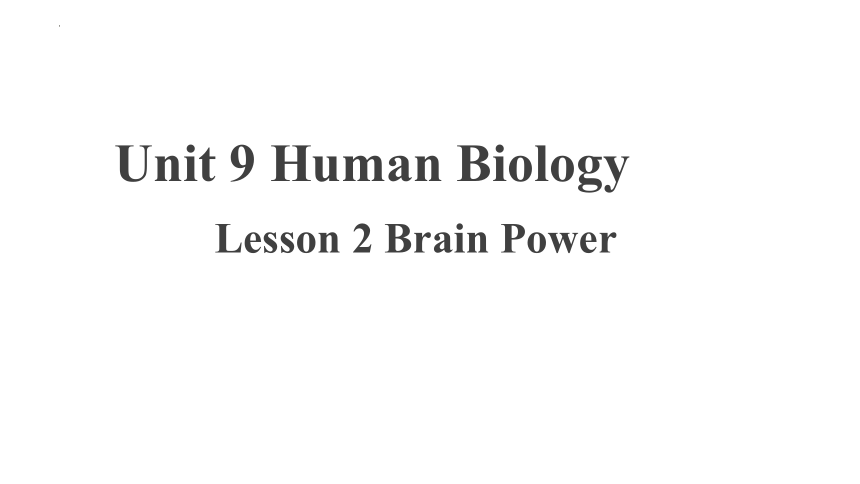
|
|
| 格式 | zip | ||
| 文件大小 | 5.3MB | ||
| 资源类型 | 教案 | ||
| 版本资源 | 北师大版(2019) | ||
| 科目 | 英语 | ||
| 更新时间 | 2022-12-26 00:00:00 | ||
图片预览

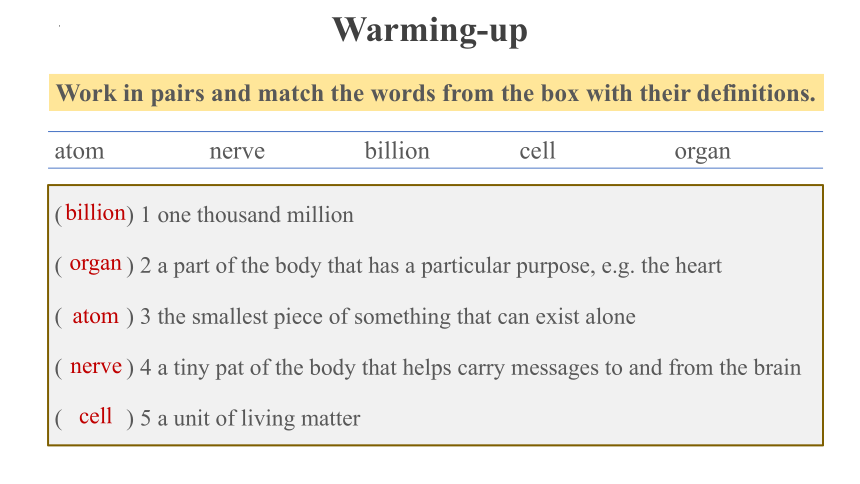
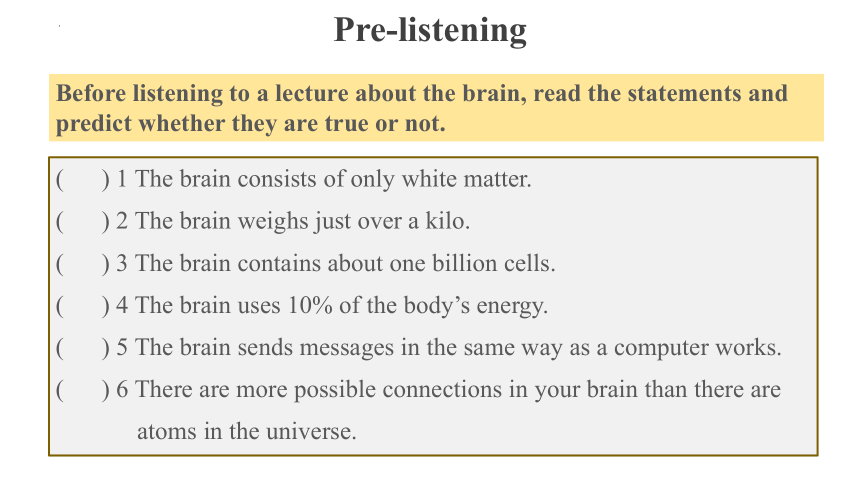

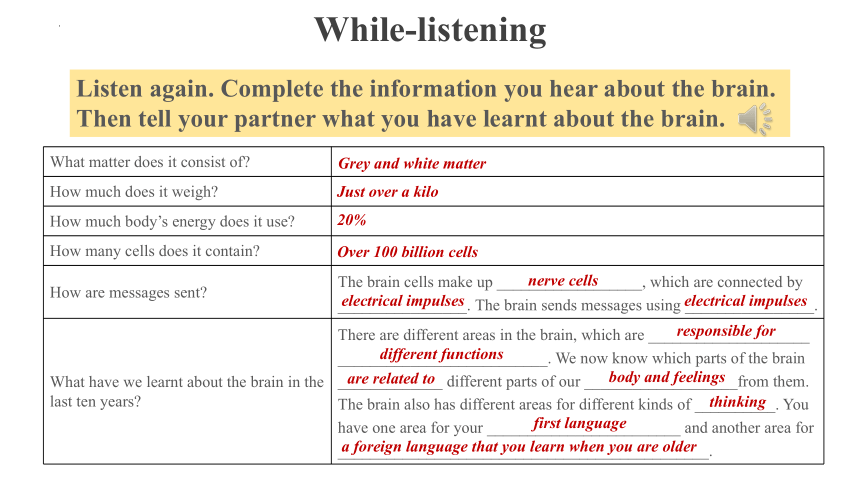

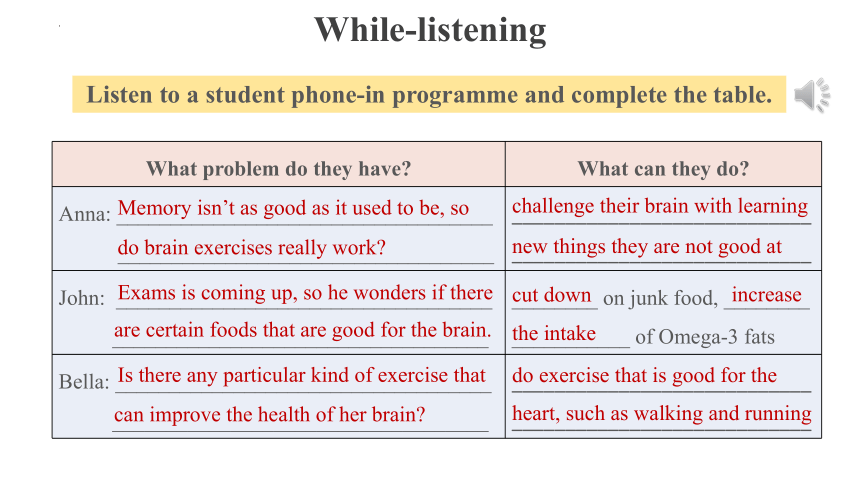
文档简介
(共17张PPT)
Unit 9 Human Biology
Lesson 2 Brain Power
Warming-up
atom nerve billion cell organ
( ) 1 one thousand million
( ) 2 a part of the body that has a particular purpose, e.g. the heart
( ) 3 the smallest piece of something that can exist alone
( ) 4 a tiny pat of the body that helps carry messages to and from the brain
( ) 5 a unit of living matter
billion
organ
atom
nerve
cell
Work in pairs and match the words from the box with their definitions.
Pre-listening
( ) 1 The brain consists of only white matter.
( ) 2 The brain weighs just over a kilo.
( ) 3 The brain contains about one billion cells.
( ) 4 The brain uses 10% of the body’s energy.
( ) 5 The brain sends messages in the same way as a computer works.
( ) 6 There are more possible connections in your brain than there are
atoms in the universe.
Before listening to a lecture about the brain, read the statements and predict whether they are true or not.
Listen to the lecture and check your answers. Correct the false ones.
( ) 1 The brain consists of only white matter.
( ) 2 The brain weighs just over a kilo.
( ) 3 The brain contains about one billion cells.
( ) 4 The brain uses 10% of the body’s energy.
( ) 5 The brain sends messages in the same way as a computer works.
( ) 6 There are more possible connections in your brain than there are
atoms in the universe.
While-Listening
grey and white matter
F
T
F
F
T
T
one hundred billion cells
20%
While-listening
What matter does it consist of Grey and white matter
How much does it weigh
How much body’s energy does it use
How many cells does it contain
How are messages sent The brain cells make up __________________, which are connected by ________________. The brain sends messages using ________________.
What have we learnt about the brain in the last ten years There are different areas in the brain, which are ____________________
__________________________. We now know which parts of the brain _____________ different parts of our ___________________from them. The brain also has different areas for different kinds of __________. You have one area for your ________________________ and another area for ______________________________________________.
Listen again. Complete the information you hear about the brain. Then tell your partner what you have learnt about the brain.
Just over a kilo
20%
Over 100 billion cells
nerve cells
electrical impulses
electrical impulses
responsible for
different functions
are related to
body and feelings
thinking
first language
a foreign language that you learn when you are older
While-listening
The brain consists of (1) _______________ matter. It weighs (2) ______________. It uses (3) ______ of the body’s energy. It contains over (4) ______________ which make up nerve cells. These nerve cells are connected by electrical impulses. There are more possible connections in one brain than there are (5) ____________________. Scientists have mapped different areas of the brain that are responsible for (6) ________________. There are also different areas for different types of thinking, such as learning your own language and learning a (7) ______________ language.
Complete the summary with the words from the lecture.
grey and white
just over a kilo
20%
100 billion cells
atoms in the universe
different functions
foreign
While-listening
What problem do they have What can they do
Anna: ___________________________________ ___________________________________ ____________________________
____________________________
John: ___________________________________ ___________________________________ ________ on junk food, ________
___________ of Omega-3 fats
Bella: ___________________________________ ___________________________________ ____________________________
____________________________
Listen to a student phone-in programme and complete the table.
Memory isn’t as good as it used to be, so
do brain exercises really work
Exams is coming up, so he wonders if there
are certain foods that are good for the brain.
Is there any particular kind of exercise that
can improve the health of her brain
challenge their brain with learning
new things they are not good at
cut down
increase
the intake
do exercise that is good for the
heart, such as walking and running
While-listening
Asking for and Giving Advice
Asking for Advice
____________________ try them
____________________, Professor Kim
So what kinds of activities ___________________
Is there any particular kind of exercise … ________________
Giving Advice
1 _________________________ try learning a new language …
2 _________________________ is to cut down on junk food.
3 _________________________ increase your intake of …
4 _________________________ do exercise that is good for your heart.
Talk Builder
Listen and plete the Talk Builder.
Should I
What’s your advice
do you suggest
What should I do
You could
One thing you can do
It might also be a good idea to
I advise you to
Speaking
Be Good to Your Brain
Eat healthy foods.
Get a lot of playtime (exercise).
Don’t drink alcohol, take drugs, or use tobacco.
Use your brain by doing challenging activities.
…
Work in groups for more ways to increase brain power. Then give a short presentation to the class.
Speaking
1. Exercise
We all know that we should be getting regular exercise. However, most people lead busy, rushed lives, and can’t always find the time to fit physical activity in. The trick might be to think of it in reverse: you can’t afford not to exercise if you want to live a long, healthy, productive life.
Speaking
2. Get some sunlight
Sunlight and exercise can sometimes go hand in hand. Getting too little sunlight is not good for your brain. Higher levels of vitamin D in your system allow you to perform better, and can even slow down the aging of your brain. Too much sunlight can be bad for your skin, but if you aren’t getting enough, your brain functions may suffer. Of course, you can always take vitamin D supplements if you find that you aren’t able to get outside as much as you would like to. Just remember to take supplements in moderation.
Speaking
3. Build strong connections
If you often feel lonely, it can actually result in psychological and cognitive decline, as these feelings can have a negative impact on your sleep, increase your blood pressure, contribute to depression and even lower your overall well-being. The key thing is to build a strong support system around you, as that will enable you to stay healthy mentally and psychologically over the long term.
Speaking
4. Meditate
Meditation is a trending topic among many entrepreneurs right now, and its benefits are hard to argue with. Not only does meditation reduce your stress levels, it can also prevent age-related disorders such as Alzheimer’s or dementia. This speaks to the importance of self-care. Taking a mere 10 to 15 minutes out of your day to practice meditation could extend your cognitive longevity and allow you to reduce your overall stress levels too.
Speaking
5. Sleep well
Sleep is required to consolidate memory and learning. If you don’t get enough sleep, your gray-matter volume in your frontal lobe may begin to decrease. Your frontal lobe supports and controls your working memory as well as executive function, making it particularly important. In short, if you don’t get enough sleep, you’ll have less brain in your head.
Speaking
6. Eat well
It shouldn’t come as a surprise that nutrition plays a significant part in your brain health. You have to focus on getting the right kind of nutrition. Antioxidants and amino acids are particularly important, and vitamin E can also be beneficial. Nuts, blueberries, whole grains, and avocados are also beneficial. What’s good for your body also tends to be good for your brain.
antioxidant: 抗氧化物质
amino acid: 氨基酸
avocado: 牛油果,鳄梨
Assignment
Recall what you have learned in the class and write a short paragraph about how to increase brain power.
Goodbye!
Unit 9 Human Biology
Lesson 2 Brain Power
Warming-up
atom nerve billion cell organ
( ) 1 one thousand million
( ) 2 a part of the body that has a particular purpose, e.g. the heart
( ) 3 the smallest piece of something that can exist alone
( ) 4 a tiny pat of the body that helps carry messages to and from the brain
( ) 5 a unit of living matter
billion
organ
atom
nerve
cell
Work in pairs and match the words from the box with their definitions.
Pre-listening
( ) 1 The brain consists of only white matter.
( ) 2 The brain weighs just over a kilo.
( ) 3 The brain contains about one billion cells.
( ) 4 The brain uses 10% of the body’s energy.
( ) 5 The brain sends messages in the same way as a computer works.
( ) 6 There are more possible connections in your brain than there are
atoms in the universe.
Before listening to a lecture about the brain, read the statements and predict whether they are true or not.
Listen to the lecture and check your answers. Correct the false ones.
( ) 1 The brain consists of only white matter.
( ) 2 The brain weighs just over a kilo.
( ) 3 The brain contains about one billion cells.
( ) 4 The brain uses 10% of the body’s energy.
( ) 5 The brain sends messages in the same way as a computer works.
( ) 6 There are more possible connections in your brain than there are
atoms in the universe.
While-Listening
grey and white matter
F
T
F
F
T
T
one hundred billion cells
20%
While-listening
What matter does it consist of Grey and white matter
How much does it weigh
How much body’s energy does it use
How many cells does it contain
How are messages sent The brain cells make up __________________, which are connected by ________________. The brain sends messages using ________________.
What have we learnt about the brain in the last ten years There are different areas in the brain, which are ____________________
__________________________. We now know which parts of the brain _____________ different parts of our ___________________from them. The brain also has different areas for different kinds of __________. You have one area for your ________________________ and another area for ______________________________________________.
Listen again. Complete the information you hear about the brain. Then tell your partner what you have learnt about the brain.
Just over a kilo
20%
Over 100 billion cells
nerve cells
electrical impulses
electrical impulses
responsible for
different functions
are related to
body and feelings
thinking
first language
a foreign language that you learn when you are older
While-listening
The brain consists of (1) _______________ matter. It weighs (2) ______________. It uses (3) ______ of the body’s energy. It contains over (4) ______________ which make up nerve cells. These nerve cells are connected by electrical impulses. There are more possible connections in one brain than there are (5) ____________________. Scientists have mapped different areas of the brain that are responsible for (6) ________________. There are also different areas for different types of thinking, such as learning your own language and learning a (7) ______________ language.
Complete the summary with the words from the lecture.
grey and white
just over a kilo
20%
100 billion cells
atoms in the universe
different functions
foreign
While-listening
What problem do they have What can they do
Anna: ___________________________________ ___________________________________ ____________________________
____________________________
John: ___________________________________ ___________________________________ ________ on junk food, ________
___________ of Omega-3 fats
Bella: ___________________________________ ___________________________________ ____________________________
____________________________
Listen to a student phone-in programme and complete the table.
Memory isn’t as good as it used to be, so
do brain exercises really work
Exams is coming up, so he wonders if there
are certain foods that are good for the brain.
Is there any particular kind of exercise that
can improve the health of her brain
challenge their brain with learning
new things they are not good at
cut down
increase
the intake
do exercise that is good for the
heart, such as walking and running
While-listening
Asking for and Giving Advice
Asking for Advice
____________________ try them
____________________, Professor Kim
So what kinds of activities ___________________
Is there any particular kind of exercise … ________________
Giving Advice
1 _________________________ try learning a new language …
2 _________________________ is to cut down on junk food.
3 _________________________ increase your intake of …
4 _________________________ do exercise that is good for your heart.
Talk Builder
Listen and plete the Talk Builder.
Should I
What’s your advice
do you suggest
What should I do
You could
One thing you can do
It might also be a good idea to
I advise you to
Speaking
Be Good to Your Brain
Eat healthy foods.
Get a lot of playtime (exercise).
Don’t drink alcohol, take drugs, or use tobacco.
Use your brain by doing challenging activities.
…
Work in groups for more ways to increase brain power. Then give a short presentation to the class.
Speaking
1. Exercise
We all know that we should be getting regular exercise. However, most people lead busy, rushed lives, and can’t always find the time to fit physical activity in. The trick might be to think of it in reverse: you can’t afford not to exercise if you want to live a long, healthy, productive life.
Speaking
2. Get some sunlight
Sunlight and exercise can sometimes go hand in hand. Getting too little sunlight is not good for your brain. Higher levels of vitamin D in your system allow you to perform better, and can even slow down the aging of your brain. Too much sunlight can be bad for your skin, but if you aren’t getting enough, your brain functions may suffer. Of course, you can always take vitamin D supplements if you find that you aren’t able to get outside as much as you would like to. Just remember to take supplements in moderation.
Speaking
3. Build strong connections
If you often feel lonely, it can actually result in psychological and cognitive decline, as these feelings can have a negative impact on your sleep, increase your blood pressure, contribute to depression and even lower your overall well-being. The key thing is to build a strong support system around you, as that will enable you to stay healthy mentally and psychologically over the long term.
Speaking
4. Meditate
Meditation is a trending topic among many entrepreneurs right now, and its benefits are hard to argue with. Not only does meditation reduce your stress levels, it can also prevent age-related disorders such as Alzheimer’s or dementia. This speaks to the importance of self-care. Taking a mere 10 to 15 minutes out of your day to practice meditation could extend your cognitive longevity and allow you to reduce your overall stress levels too.
Speaking
5. Sleep well
Sleep is required to consolidate memory and learning. If you don’t get enough sleep, your gray-matter volume in your frontal lobe may begin to decrease. Your frontal lobe supports and controls your working memory as well as executive function, making it particularly important. In short, if you don’t get enough sleep, you’ll have less brain in your head.
Speaking
6. Eat well
It shouldn’t come as a surprise that nutrition plays a significant part in your brain health. You have to focus on getting the right kind of nutrition. Antioxidants and amino acids are particularly important, and vitamin E can also be beneficial. Nuts, blueberries, whole grains, and avocados are also beneficial. What’s good for your body also tends to be good for your brain.
antioxidant: 抗氧化物质
amino acid: 氨基酸
avocado: 牛油果,鳄梨
Assignment
Recall what you have learned in the class and write a short paragraph about how to increase brain power.
Goodbye!
